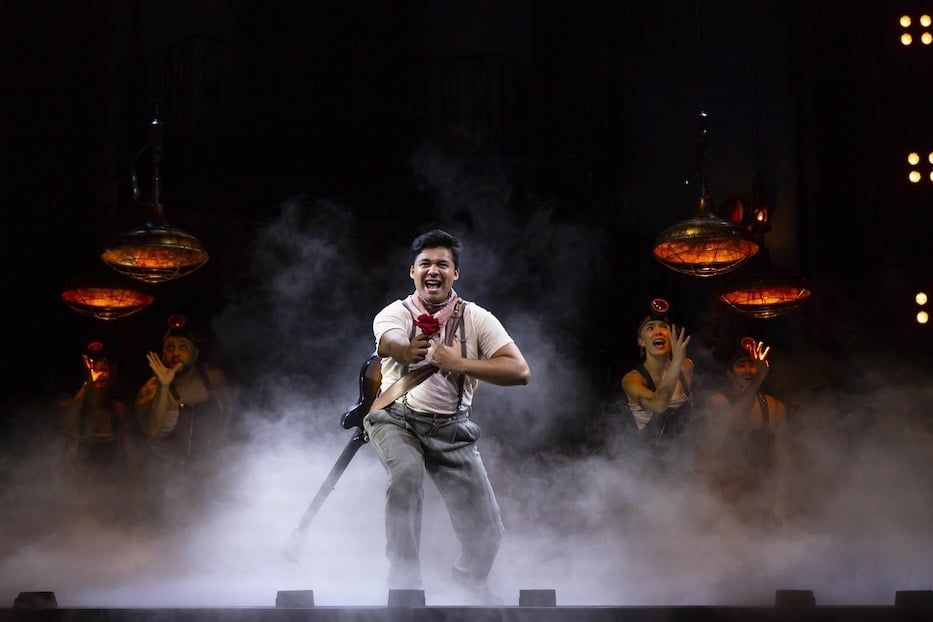
Education & Youth | Educational Center for the Arts | Arts & Culture | Musical Theater | Shubert Theatre
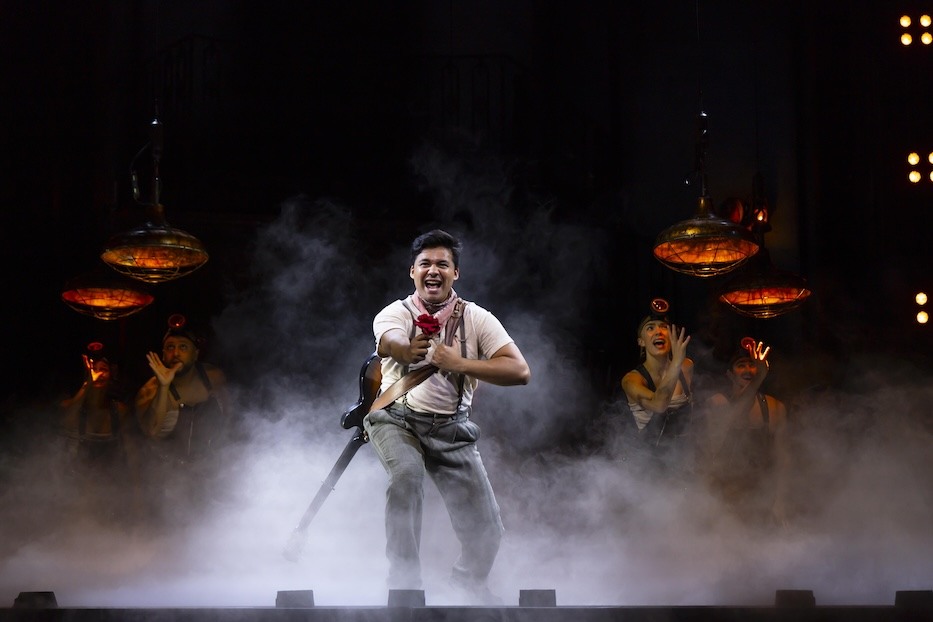
J. Antonio-Rodriguez and-company in Hadestown. T. Charles-Erickson Photo.
In the center of the stage, Orpheus was on his way to hell. Wisps of white smoke rose around his legs. Flashes of light danced through the darkness, until an orange glow appeared on all sides. When a quintet of lanterns swung from behind him, there was a collective gasp in an otherwise silent house.
In Row K, high school freshman Charles Nixon let out a deep, reverent sound reserved for church. Orpheus reached out his hand to the audience, and Nixon moved to the edge of his seat.
That scene unfolded Thursday afternoon, as Nixon joined 1,500 students at the Shubert Theatre for a matinee of Hadestown that did not leave a dry eye in the house. At turns sharply political, heart-wrenching, and visually arresting, the musical is a jazz-age retelling of Orpheus and Eurydice, set in what appears to be New Orleans in the first half of the 20th century.
“It is so exciting to have the opportunity to welcome students,” said Anthony McDonald, executive director of the Shubert. He recalled his own entry into theater, which transformed his whole professional trajectory. “These moments really affect the way we view our future.”

Freshmen Charles Nixon and Amelie Michaelson. Lucy Gellman Photo.
Written by Anaïs Mitchell in 2006 and reworked from 2012 to 2016, Hadestown reimagines the Greek tragedy of Orpheus (J. Antonio Rodriguez) and Eurydice (Amaya Braganza), who fall in love only to be separated (and then reunited, and then separated again) by Eurydice’s untimely death. Devastated, Orpheus travels to the underworld to bring her back.
When he meets an uncompromising Hades (Jamal Lee Harris, in for Matthew Patrick Quinn), he plays a song so moving that the God of the Underworld remembers his own love for Persephone (Lana Gordon) and allows the two to leave—on one condition. Orpheus must lead Eurydice out of hell without looking back.
In the audience, we know how this ends. Doubt is an insidious thing: Orpheus turns around when he sees daylight, sending Eurydice back to eternal damnation.
It was that story that drew Nixon, a freshman at James Hillhouse High School and the ACES Educational Center for the Arts (ECA), to the show. Earlier this year, he became interested in Hadestown when several peers suggested that his vocal range might be a good fit for Hades. For years, he’s balanced an interest in ancient history with a growing musical wheelhouse, including bass, drums, vocals and most recently guitar. So when the school announced that students were going, he was thrilled.
“I’m going in blind,” he said before the show, as he settled in to his seat with fellow ECA students. “I’m really excited though.”
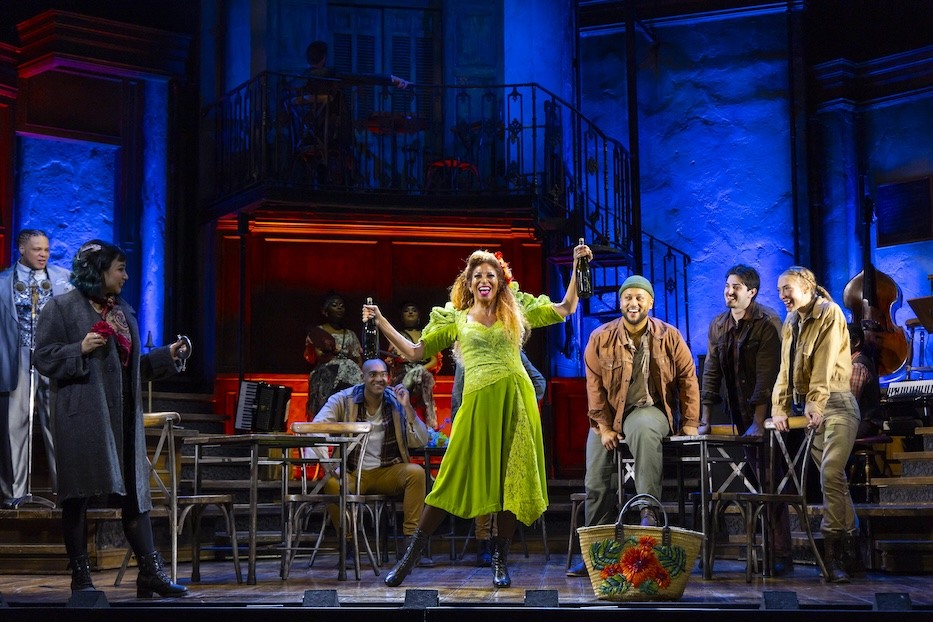
Lana-Gordon and-company in Hadestown. T. Charles Erickson Photo.
As the lights came down, he had every reason to be. Onstage, Will Mann stepped out of the shadows and transformed into Hermes, the winged messenger of the Gods. As he lifted his arms with an Alright?, Nixon spotted feathers at his wrists, and seemed to make a mental note. Hermes cleared his throat, and suddenly a brassy, bouncing trombone made it hard to stay still.
Within moments, Nixon had stepped from one world into another, from New Haven into a place of myth and mystery. Gordon entered as Persephone, and he burst into applause. As Eurydice began to sing in “Any Way The Wind Blows,” her voice full of soul and smoke, Nixon let out an immediate, knowing Mmmmmmm.
Something stirred onstage, and Nixon watched with bated breath. The fates (Marla Louissant, Lizzie Markson, Hannah Schreer) joined her on the chorus, and he added a barely audible “Oh!” As if on cue, their voices melted into each other. Moments later, Orpheus jogged toward Eurydice, and every eye in the audience stayed fixed on the stage.
“You wanna talk to her?” Hermes asked a wide-eyed Orpheus, and Nixon studied every move as if he was onstage himself, in the center of the action. “Don’t come on too strong.”
“Come home with me!” Rodriguez-as-Orpheus announced, kneeling and extending his arms. Nixon laughed with the rest of the audience, and then settled in for the first half of a story almost as old as time itself.
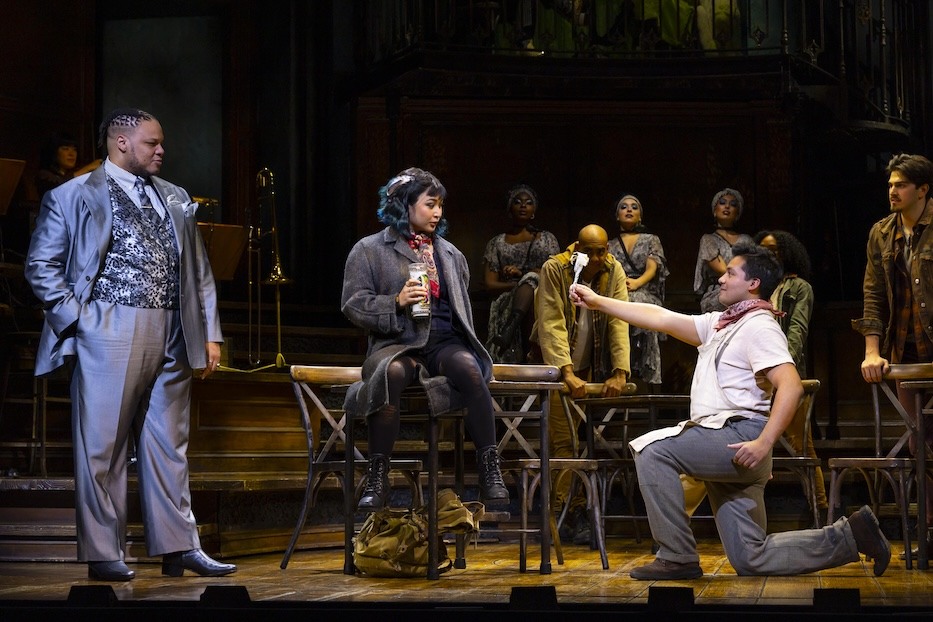
Will-Mann, Amaya-Braganza, J. Antonio-Rodriguez and company in Hadestown. T. Charles Erickson Photo.
As it unfolded, it became a reminder of theater’s ability to electrify a space, to take it over and teach in the process. Orpheus sang a red carnation into being, and Nixon breathed in deeply, that kind of breath that means there is still magic in the world. Orpheus and Eurydice danced themselves into a hesitant, then all-consuming love for each other, and Nixon looked on, as though maybe this time Orpheus could protect them from the ending that they know is coming.
The play deepened, and Nixon ventured father into it. Persephone returned from the underworld, and he let the ease and soul of “Livin’ It Up On Top” carry him as spring bloomed across the stage. She descended, and he watched how Mitchell knitted Gordon’s energetic vocals with Hades’ greed and hunger for empire.
“It explores capitalism and poverty so well,” he later said during intermission.
Throughout, he held on to every note, sometimes conducting from his seat. Hades courted Eurydice in “Hey, Little Songbird,” and he listened to Harris’ gravelly-but-smooth bass envelop the whole stage. When Eurydice, surrounded by a swirl of piano, percussion, and trombone, chose to die by snake bite in the midst of a winter storm, Nixon uttered a rapturous “Get it girl!”
Nowhere was that truer than during the song “Wait for Me,” which employs huge, swinging lights that slice through the darkness as they surround Orpheus. In the center of the stage, Orpheus let the fates try to talk him out of it, pushing back against them as he belted out the hook. Percussion rolled beneath Hermes, and he urged Orpheus on. For a moment, it seemed as though Nixon forgot to exhale.
“I couldn’t look away, even with the lights blaring in my eyes,” he said during intermission. “It’s very powerful.”
“That was some of the best writing ever,” he added. Growing up in New Haven, he was no stranger to the kind of poverty from which Hades tries to gird the underworld, creating a culture of fear and illusion of safety. In songs like “Why We Build The Wall”—written well before the election of Donald Trump in 2016—he can see a hatred of poor people and those perceived as different that is baked into the history of the United States.
“This is probably one of the few things that really shows how workers are exploited,” he said. Just a few songs before, he had watched the oil-smudged, overall-clad lost souls of the underworld hum and chant their way through a day’s labor, keeping their eyes averted and heads low as they hammered and lifted, hammered and lifted.
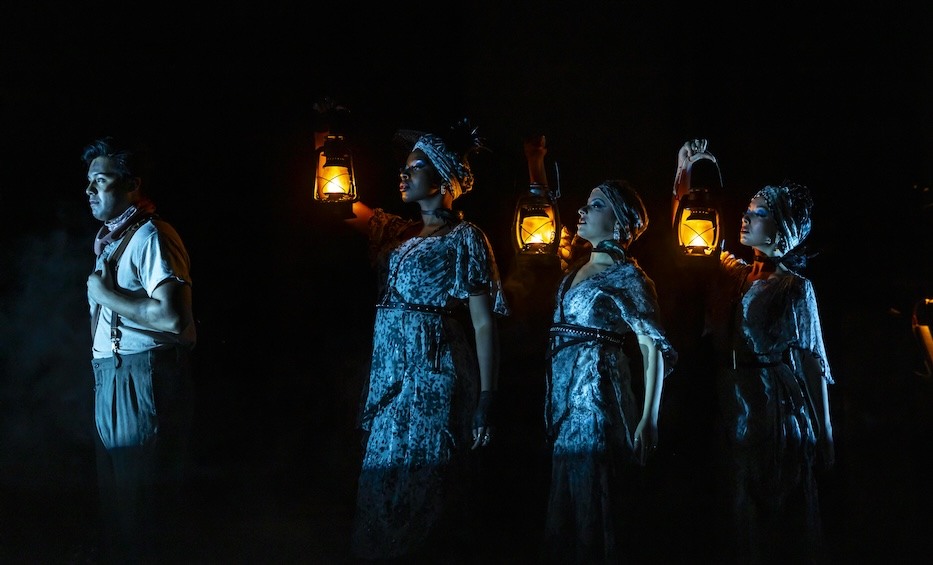
J. Antonio Rodriguez, Marla Louissaint, Lizzie Markson and-Hannah Schreer in Hadestown. T. Charles Erickson Photo.
And yet, he also felt the hopeful tug of Orpheus’ love, for which the character literally goes to the ends of the earth, and then its boiling-hot core. “It shows that there’s always a flower that can bloom from it,” he said. Just minutes later, that red carnation reappeared onstage, like an omen that another world was possible. Or as Orpheus says: “To the world we dream about—and the one we live in now.”
Beside him, fellow freshman Amelie Michaelson declared the show amazing. A vocalist and flutist at ECA, she was keeping an especially close eye on the fates, whose performance of “When The Chips Are Down” is one of the selections ECA students are working on this spring. She liked the resonance with which they sang, a nasally pitch that she hadn’t thought to bring to the song.
“It [theater] lets you explore putting yourself in someone else’s shoes,” she said. “You’re expressing emotions that are part of someone else’s story. It gives you empathy.”
That enthusiasm followed them right into the second act. As pianist Eric Kang reappeared onstage, the audience cheered, and Nixon let out an infectious “Ayoooooo!" He kept it going as the play traveled to the depths of the underworld, where Orpheus had found Eurydice and was sowing the seeds of labor unrest.
“Is it true-eee-eee?” Orpheus asked Eurydice of her deal with Hades, and a chorus came to life around him. As ensemble members began to break from their labor, Nixon watched intently, imagining the high walls of stone and steel that Hermes conjures in his narration. Why do we turn away when our brother is bleeding? they asked, and Nixon could feel the question echoing through the worlds onstage and off. Why do we build a wall and call it freedom?
The reminder—that the world could be different, if people worked collectively against systems of power—seemed to resonate with him. He watched as laborers began to question the single power that had kept them down. He moved to the edge of his seat as they begged Orpheus not to leave them. By the time Orpheus began to sing to Hades, he had joined along, quietly singing the chorus from his chair as his hand swept through the air.
Onstage, jazz flowed into something paced and sweet. Hades and Persephone extended their hands to each other, and began to dance.
Surely, that is what theater, in its best and most divine form, is meant to do. When McDonald booked the show, he could not have known that students would hear it with ears attuned to ill-fated love, worker exploitation, poverty and labor unrest in their own city. He could not have known that just blocks away, protesters would be fighting for the same freedom that the ensemble can feel in its bones.
And he could not have known, perhaps, the collective devastation that a tragic ending—however inevitable—can bring to an audience of teenagers. When Orpheus, half bathed in light, looked back at Eurydice, Nixon shared in a wave of despair that shook and rippled through the house. It was the sound of sudden, shocked grief.
“Oh please!” Nixon exclaimed. Onstage, Orpheus crumpled into a heap. “No you don’t!” From the mezzanine above came a cry of “Oh shit,” followed narrowly by a “Are you serious?” Back in Row K, Nixon let disbelief wash over him.
Hermes cleared his throat. It's a sad song/It's a sad tale, he sang with a slowness, like he was feeling the words in his mouth. Keys tinkled beneath him. It's a sad song/But we sing it anyway.
The play appeared to fold in on itself. 'Cause here’s the thing/To know how it ends— Nixon watched it begin again. And still begin to sing it again/As if it might turn out this time. It was spring. Orpheus met Eurydice all over again, offered her a match. Can you see it? They were so young and so in love. Can you hear it? Can you feel it like a train?
Is it coming? Is it coming this way?
Applause filled the house. Nixon sprang to his feet and cheered. At the lip of the stage, Persephone raised a glass to the story. Nixon clapped for what felt like minutes.
Then he and Michaelson turned around, spotted their classmates, and began their walk back into the bright sunlight.
Hadestown runs at the Shubert Theatre, 247 College St. in New Haven, through May 5. Tickets and more information are available here.

